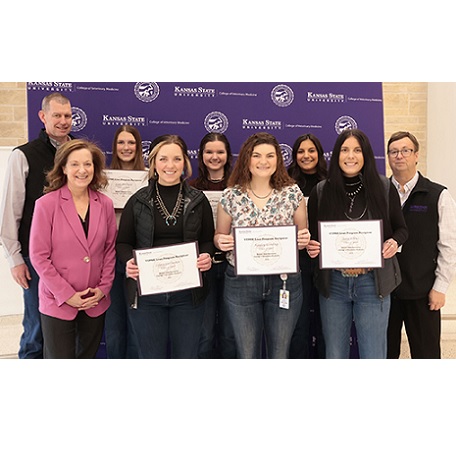Tara Ellenz of Tipton Receives Veterinary Training Program for Rural Kansas Scholarship

Tara Ellenz of Tipton, a first-year student in the College of Veterinary Medicine at Kansas State University, has been chosen for the largest veterinary scholarship program offered by the state of Kansas: the Veterinary Training Program for Rural Kansas, or VTPRK.
"The VTPRK continues to serve a critical role by supporting access to quality veterinary care in the rural parts of Kansas," said Hodes Family Dean Bonnie Rush. "This year’s scholars follow in the footsteps of a dedicated group of professionals who have built lasting, meaningful careers across the state. Current and former VTPRK recipients have built a strong community of support to promote success in rural practice."
The Veterinary Training Program for Rural Kansas was originally passed by the state Legislature in 2006 as a financial incentive to provide rural areas of the state with committed veterinarians. It was enhanced in 2022 based on the demonstrated success of the program of increasing the availability of veterinary care in rural Kansas.
Upon completion of their Doctor of Veterinary Medicine degree, each student is required to work at a full-time veterinary practice in one of the 92 Kansas counties with fewer than 40,000 residents. For each year the student works in rural Kansas, up to $25,000 per year of qualifying student loans are forgiven over a period of four years.
To date, 98% of graduates are completing or have completed their loan obligation through service. Graduates who do not complete through service are required to repay the loan. The funds are reinvested through the addition of students to the program. Ninety-four percent of previous graduates who completed their four-year obligation remain in a qualifying county. Seventy-seven percent remain in the original practice and community they entered after graduation.
Part of the required training includes the completion of a Food Animal Veterinary Certificate. The student scholars also spend time during the summer and breaks in the academic year learning about foreign-animal disease preparedness, natural disaster response, rural sociology, small business management and public health. During their senior year, they will spend three weeks in a rural veterinary practice, applying the principles of small business management to rural veterinary practice.
